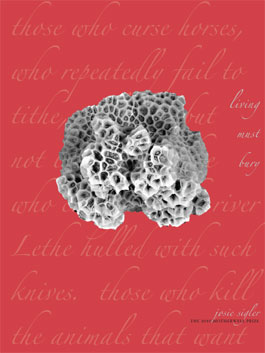Winner of the 2010 Motherwell Prize
Living Must Bury is a powerhouse, a slaughterhouse, a cathouse-oracle of a first book. Josie Sigler’s incantatory poems build in yawps of collage that carve out the shape of her poems’ heart-puncturing hurt. She fearlessly attempts an articulation of pain through a spectrum of swerving assemblages: historical “truths,” anthropological and lexical classifications, confessional family narratives, and, among numerous others, evidence from the world around us. Indebted to Sappho and often darkly Whitmanic, these metamorphic poems praise life’s bleeding by recognizing the wound. They live within the friction, the violent tensions created when the world’s manifold and sometimes oppositional “truths” collide. They batter that savageness with the myth-making and fablesque power of an accreting, long-lined language. Sigler’s work is buttressed with eroticism, the puzzlement that backdrops communication, Sexton’s forlorn and steely confrontations, and the very best of Levis. Sigler welcomes the painful and volatile—and in taking it on, she creates an intricately woven music that masks and unmasks the terrible and allows us to go on. Living Must Bury is a beautifully hot-blooded book. In asking us to “stray. Swallow. Swallow more,” Sigler is, rightfully, essentially, inviting the world to listen to her sing.
—Alex Lemon, author of Fancy Beasts and Happy: A Memoir
What strange, archaic, 3-D prayer is this? A lucid palimpsest showing us where the gold is buried.
—Rachel Zucker
Unexpected in this shatteringly attached poetry is the calm speculativeness with which Josie Sigler regards and relates the objects of earthly passion. Family, beasts, sufferers distant and intimate, the earth itself, all are classified in this taxonomy of want, of tragic history and unanswered wish, and strong, strong desire. You can really feel the desire, here, for an end to suffering. That there is plenitude in language, in churchy yet aleatory rhythms of utterance, sets up a tension readers may feel in their bodies, while reading—between the truth of historical penury and the truth of reading such generosity.

